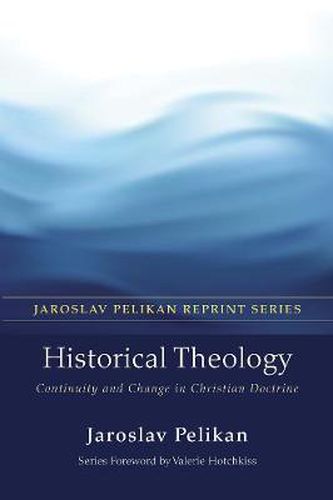Readings Newsletter
Become a Readings Member to make your shopping experience even easier.
Sign in or sign up for free!
You’re not far away from qualifying for FREE standard shipping within Australia
You’ve qualified for FREE standard shipping within Australia
The cart is loading…






This title is printed to order. This book may have been self-published. If so, we cannot guarantee the quality of the content. In the main most books will have gone through the editing process however some may not. We therefore suggest that you be aware of this before ordering this book. If in doubt check either the author or publisher’s details as we are unable to accept any returns unless they are faulty. Please contact us if you have any questions.
Change is a universal phenomenon that commands the attention of the historian. For Christian theology, change raises special difficulties. How are we to reconcile the notion of the revelation of an unchanging God, who is abiding truth, with the notion of the pervading mutability of all human affairs? This problem, which is as old as religion, is intensified by the Christian belief in the fullness and finality of the revelation made through Jesus Christ. Professor Pelikan begins his study of historical theology with this basic problem and traces the origins of the difficulties that inevitably follow upon the admission of the possibility of change. His investigations lead him to critically examine the dogmatic solution of Vincent of Lerins, the later dialectical interpretation of Abelard, the approach of Thomas Aquinas, and finally, the nineteenth century’s Adolf von Harnack to propose a working definition of Christian doctrine and of the task of the historical theologian. Pelikan’s work is a perceptive and penetrating study of the interaction of history and theology. Theology must be historical because man is historical. To neglect history, or worse still, to renounce it, is to deny man and theology their common future. Historical Theology is a worthy introduction to a task that must continually seek to weld past, present, and future into a living whole.
$9.00 standard shipping within Australia
FREE standard shipping within Australia for orders over $100.00
Express & International shipping calculated at checkout
This title is printed to order. This book may have been self-published. If so, we cannot guarantee the quality of the content. In the main most books will have gone through the editing process however some may not. We therefore suggest that you be aware of this before ordering this book. If in doubt check either the author or publisher’s details as we are unable to accept any returns unless they are faulty. Please contact us if you have any questions.
Change is a universal phenomenon that commands the attention of the historian. For Christian theology, change raises special difficulties. How are we to reconcile the notion of the revelation of an unchanging God, who is abiding truth, with the notion of the pervading mutability of all human affairs? This problem, which is as old as religion, is intensified by the Christian belief in the fullness and finality of the revelation made through Jesus Christ. Professor Pelikan begins his study of historical theology with this basic problem and traces the origins of the difficulties that inevitably follow upon the admission of the possibility of change. His investigations lead him to critically examine the dogmatic solution of Vincent of Lerins, the later dialectical interpretation of Abelard, the approach of Thomas Aquinas, and finally, the nineteenth century’s Adolf von Harnack to propose a working definition of Christian doctrine and of the task of the historical theologian. Pelikan’s work is a perceptive and penetrating study of the interaction of history and theology. Theology must be historical because man is historical. To neglect history, or worse still, to renounce it, is to deny man and theology their common future. Historical Theology is a worthy introduction to a task that must continually seek to weld past, present, and future into a living whole.